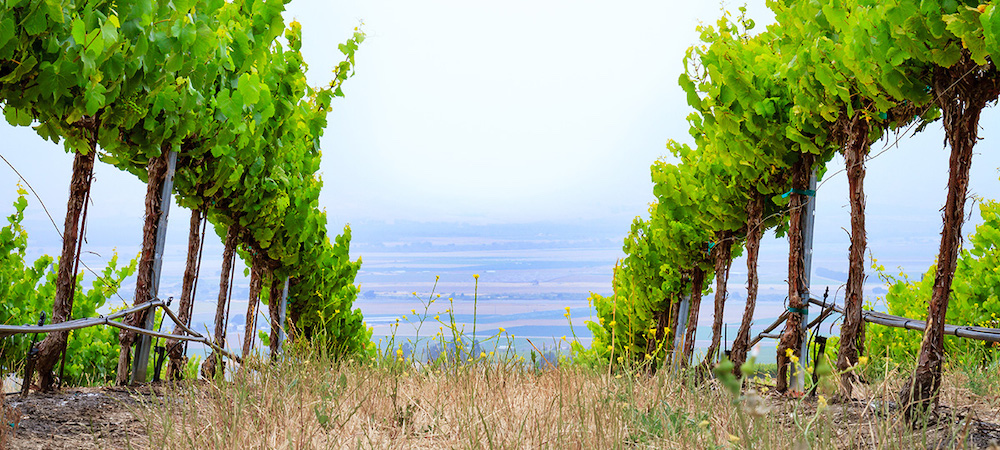
September 9, 2025 – What a difference a decade makes. When I got news of the impending demise of the Monterey County Vintners and Growers Association—an organization I’ve had the great pleasure of working with over several decades—my first thought was, “What would Richie Smith have to say in this moment?”
Rich Smith of Paraiso Vineyards was one of the pioneers of the organization of grape growers that became the MCVGA. Moving from Campbell to Soledad with his wife Claudia, he traded in ag lab job for farming the dirt and in 1987 he purchased his first 350 acres of vineyard land, which became the estate Paraiso Vineyard. In 1989, Smith crushed and bottled his first Paraiso wines—a Pinot Noir and a Chardonnay. At the time, Smith was one of the young upstart farmers looking at new ways of farming for better quality and not just quantity. It was a revolutionary concept.
Smith was a very philosophical person: eminently esoteric yet so very deeply practical. At heart, he was a farmer and a dreamer and a philanthropist. He always sought the greatest advantage in cooperation rather than competition. He was generous and optimistic, no matter the circumstance.
He was one of the first persons in Monterey I ever interviewed at length, and although the topic of that time was harvest and weather, the next story was juicier. It had to do with the formation of the Santa Lucia Highlands AVA. I remember going to the first event, held at Paraiso, with the ragtag bunch of growers who were optimistically setting forth on their own mission, a part of, but very separate from, the Monterey mothership.
Smith and his colleagues, in particular, Dan Lee of Morgan, Gary Pisoni, Gary Franscioni and Joe and Tondre Allarid of Tondre Grapefields, were beyond excited about what this small but mighty subsection of the greater Monterey AVA could do. Little did they know what it not only could do but would do over the next 24 years.
Forming the Santa Lucia Highlands Wine Artisans might be the lifeline for the entire wine region going forward. It’s a vibrant group of wineries and growers, with a focus and targeted mission, a streamlined approach to events and a fantastic Executive Director, Gwen McGill. Granted, she’s got a great Board of committed and earnest growers, who have a common goal and purpose. They hold out hope for the future of the Monterey region.

I recently caught up with Jason Smith, Rich’s son and CEO of Valley Farm Management and Paraiso Family Vineyards. His soul-searching over the state of grapes in Monterey County is over. So is his involvement in actual grape farming.
“We’ve gone from 3,000 acres of grapes to just 160,” he says. “And by January 1, 2026, that acreage will be zero.”
Effectively, he is shutting down the entire operation his father founded 52 years ago, and which they ran together until Rich passed in 2015.
There are many reasons, including the increasingly high cost of farming and a continued softening of the grape market. In fact, it’s downright mushy.
“We went from being 90% contracted out last year to less than 40% this year,” says Smith. “I kept looking at the numbers and trying to make them pencil out, but the fact I had so little collateral to go to the bank with for a loan on my up-front farming costs, just wasn’t viable.”
Even after he had sold land that was already fallow, reducing the family’s holdings, the income from the remaining acreage in Arroyo Seco and the Santa Lucia Highlands, just wouldn’t cover the outlay.
So, he reached out to the greater farming community and fortunately found a taker in Jackson Family Wines. “They are locally based and want to continue being invested in local land,” says Smith. Ordinarily a deal like this would not have been of interest, he says, but the fact they can use the fruit and continue to hold the land, was appealing.
“Basically, Jackson Family said, ‘We are here to stay and Arroyo Seco and SLH is where we are based and we would be interested in your vineyards,’” Smith told me.
“In the past, a lease takeover would not be of interest, but in this climate a shorter term with no capital needed to put in fills a gap for them until we get to the other side,” says Smith. “It also gives them vineyards they like and possible ground in the future if they want to replant.”
He expects they will take all Chardonnay off those vineyards. “I have sold most of the Pinot for this year on the vineyard in SLH that has it,” says Smith. “Jackson Family will probably take some of that fruit next year and down the road, as well all the fruit from the Arroyo Seco vineyards which is almost all Chardonnay, along with some Pinot Grigio and Pinot Blanc.”
Smith says he was able to place most of his staff with other ag operations in the greater Valley, while some decided to retire. “We had employees with us for 40 plus years,” he noted.
Asked about his plans for the future, Smith is contemplating options. “Looking at many different avenues, from staying in the industry to something way out of the box. Bottom line is there are bills to pay…I, we will figure it out.”
For now, he remains on the MCVGA Board of Directors, and reports they are working on next steps, with a focus on covering their public policy piece by working with the grower/shipper organization and Farm Bureau.
“Nothing towards marketing at this time,” says Smith. “It will be a reinvention on the other side, while working with the existing SLH and Arroyo Seco groups.”
On the future of farming in Monterey County in particular, he is sanguine. “We are a diversified county and valley for agriculture. If you drive the valley now you would see more prime open row crop ground than I’ve seen in decades. All of ag is struggling to an extent.”
He predicts that Ag will not go away, but if you aren’t vertically integrated and or tied to large companies and producers, it’s tough sledding. While he believes that family farming isn’t going away, it will be much smaller. He surmises that future generations of farmers will be doing the farming for private equity and other large companies, likely using AI and ag tech to reduce the high cost of farming.
Smith says the symbiotic relationship of ag in the valley means grapes and trees are relegated to marginal ground while row crops thrive in the loamy fertile ground of the valley floor. He says there has been some interest in avocados, and lemons went on the Bianchi bench when grapes came out.
“Overall, margins are very small and investment into crops is getting to be an interesting proposition with the cost of doing business, specifically in California, while competing around the country and internationally,” Smith says.
“It’s funny that our American and Californian consumers preach labor equity, environmental awareness and safety, yet are numb to the fact that they eat and drink products from other countries that have very few of those restrictions,” Smith notes.
“Making America great is awesome, but consumers have to buy American and be willing to pay the price, which we all know is tough, especially when most are living paycheck to paycheck.”
Where do you want to invest your hard-earned dollars: in the economy that feeds you and your neighbors, or in an offshore market?
The choice is ours, every single day.
CRU Tasting Room Remains Open
Fortunately, for fans of CRU Winery, which has a tasting room located on the Paraiso property in Soledad, the closure of Valley Farm Management does not impact their operations.
In an email to club members, CRU wrote: “The Smith family and Valley Farm Management are close friends of CRU Winery and we are saddened by this news, but CRU Winery is a separate business from Valley Farm Management. Our tasting room remains open as usual from Thursday – Sunday for tastings, events and other experiences. We will continue to craft award-winning wines from the Sarmento and Paraiso Vineyards in the Santa Lucia Highlands. Our winemaker Jose has worked closely with the team farming these vineyards (who remain the same) and will continue to do so to ensure our high-quality standards are met.”
About the author
Laura Ness is a longtime wine journalist, columnist and judge who contributes regularly to Edible Monterey Bay, Spirited, WineOh.Tv, Los Gatos Magazine and Wine Industry Network, and a variety of consumer publications. Her passion is telling stories about the intriguing characters who inhabit the fascinating world of wine and food.
- Laura Nesshttps://www.ediblemontereybay.com/author/lness/
- Laura Nesshttps://www.ediblemontereybay.com/author/lness/
- Laura Nesshttps://www.ediblemontereybay.com/author/lness/
- Laura Nesshttps://www.ediblemontereybay.com/author/lness/


